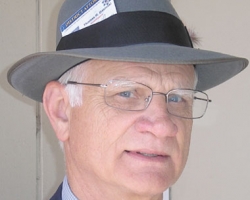I often hear guys say their fathers were/are their best friends. Not mine. My dad, Ralph Basinski, was my dad. I liked our relationship the way it was.
With World War II in progress, my mother would not marry my father. After two medical deferments she thought it was safe and they married. Bingo, the war worsened, physical standards were lowered, and he was drafted.
Between the time of the wedding and his leaving, my older brother was conceived. When my dad left for the Army, he didn’t return home for three years. There was no R&R or lengthy furloughs. He was gone.
When he returned home he had a son he had never seen, no job, no house, and little in the way of prospects. After all, there were thousands of returning GIs. Pretty soon I came along to cheer everyone up.
My dad was not a fighter in any sense of the word. My grandfather was a cauliflower-eared, barrel-chested, bent-nosed professional wrestler, back when wrestling was real.
He was a smiling, tough cop who walked a beat. My dad was not like him. Ralph Basinski was a piano player and church organist. He was an actor and an accomplished entertainer. He dabbled in magic and ventriloquism. He was very funny and an all-around good guy.
When my brother and I were growing up, there was little room in dad’s life for his talents. He worked in low-paying sales jobs. He performed some, but his artistic hands were mostly tied because of work. We lived modestly. My mom stayed at home, but took in ironing for extra money. She was a great mom, too.
There wasn’t much money for extras. We did go to a Detroit Tiger game, the Detroit Zoo, and the Henry Ford Museum. We thought the zoo was great, though it’s nothing compared to the San Diego Zoo.
My dad was a “Man of his Era.” While not a fighter, he earned two battle stars on blood-soaked Tinian and Saipan.
Many of his buddies lost their lives during those treacherous landings. Until the last few years my dad would never talk about the war. When he decided to talk about being in combat, I was transfixed and bewildered. I asked how he did it. With a shrug he said, “I had to.” And that was all that was ever said about his fear.
He was a disciplinarian. I was the only sophomore starter on the varsity football team. My mid-term geometry grade was falling below “C-Level.” My dad said if I got a “D,” football was over. I thought to myself, “Don’t you know who I am? I’m starting.” He didn’t care. Although he wasn’t an athlete, he was a football fan, and very proud of my success.
It would have pained him greatly to take me off the team, but he would have done it. That’s how he was.
I managed a “C” in geometry, grew to like it, and earned a “B” before the year was over. Go figure.
After my mother died at age 86, he knew he couldn’t stay in their home alone. Between the two of them they could get by, but he couldn’t navigate there without her. When she was alive she needed him to do certain things, too.
He moved to a retirement apartment and did well until a pacemaker was installed at age 92. He never recovered his mobility after that. He had to go to a nursing home and that’s when he decided he had had enough.
Combined with macular degeneration that robbed him of his sight, and other losses of dignity, he was helpless. Mentally, he was as good as ever.
He stopped eating and drinking, but kept a friendly face for the staff, who loved his sense of humor. They would pick up his untouched meal tray and he’d say, “That was very good, thank you.” He died a few weeks later.
When I gave his eulogy I ended with, “My dad taught me how to live, how to grow old, and how to die. You can’t ask for anything more from a dad.”
I miss him.



